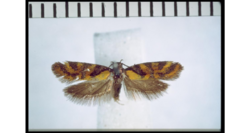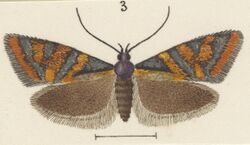Biology:Tingena decora
| Tingena decora | |
|---|---|

| |
| Male holotype | |
| Scientific classification | |
| Kingdom: | Animalia |
| Phylum: | Arthropoda |
| Class: | Insecta |
| Order: | Lepidoptera |
| Family: | Oecophoridae |
| Genus: | Tingena |
| Species: | T. decora
|
| Binomial name | |
| Tingena decora (Philpott, 1928)[1]
| |
| Synonyms[2] | |
| |
Tingena decora is a species of moth in the family Oecophoridae.[2] It is endemic to New Zealand and has been collected at Lake Rotoroa and adults are on the wing in February.
Taxonomy
This species was first described by Alfred Philpott in 1928 using specimens collected at Lake Rotoroa, near Nelson in February and named Borkhausenia decora.[3] In 1939 George Hudson discussed and illustrated this species under the name B. decora.[4] In 1988 J. S. Dugdale placed this species within the genus Tingena.[2] The male holotype is held in the New Zealand Arthropod Collection.[2]
Description

Philpott described this species as follows:
♂. 9–11 mm. Head, palpi, thorax and abdomen purplish-black. Antennae purplish-black, ciliations ¾. Legs purplish-fuscous, tarsi annulated with ochreous. Forewings, costa slightly arched, apex broadly rounded, termen rounded, strongly oblique; bright yellow to orange; markings shining silvery; an outwardly oblique fascia from 1/6, broadly margined with black, reaching beyond fold; an almost straight fascia from middle of costa to before dorsum; a triangular fascia from costa at ¾ reaching half across wing; a narrow subterminal fascia parallel to termen; the last three fasciae with a few black scales on margins: fringes dark fuscous, base orange. Hindwings dark fuscous: fringes dark fuscous with darker basal line.[3]
This species is very similar in appearance to T. compsogramma but T. docora is a more rich and darkly coloured moth.[4]
Distribution
This species is endemic to New Zealand and has been collected at Lake Rotoroa.[1]
Behaviour
This species is on the wing in February.[4]
References
Wikidata ☰ Q13860097 entry
 |
